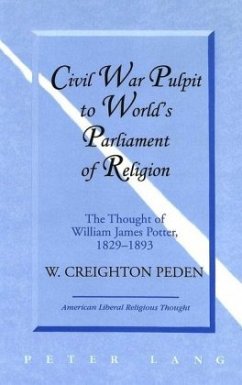Civil War Pulpit to World's Parliament of Religion presents a comprehensive exposition of the thought of William James Potter, 1829-1893. Potter was a radical minister in the American freethought tradition who moved from his Quaker foundation to Unitarian Christianity and later to free religion. Potter was a founder and leader of the Free Religious Association, 1867-1920. Following a biographical sketch, consideration is given to philosophical topics, the evolution of humans, religion, and Potter's applied philosophy. Potter's thought is also compared to that of his mentor, Theodore Parker.
"W. Creighton Peden has rendered a great service in ably presenting a compelling portrait of a clergyman whose brilliant prophetic career is all the more impressive considering the disturbing period in American history in which he lived and labored. It is an intriguing book whose timely relevance readers should find both informative and inspiring." (Frederick N. Nelson, Congregational (UCC) Clergyman, Retired)
"'In Civil War Pulpit', Dr. Peden continues his project of bringing to our attention the work of intellectual, religious and social leaders in the U.S. whose careers have been obscured. Dr. Peden introduces readers to the life and career of William James Potter in very lucid fashion. The text deals intelligently with the interplay between Potter's religious, philosophical, and social commitments; in particular he traces the influences of Potter's Quaker background and his encounters with Unitarianism and transcendentalism to his later work as a social and religious reformer. Peden highlights the actual differences that have been made by intellectuals who, like Potter, have maintained a serious interest in the conduct of life. Specifically, he focuses on Potter's work as a preacher and as a leader in the Free Religious Association. As was his previous volume on F.E. Abbot, Peden's 'Civil War Pulpit' is thoroughly researched and clearly and persuasively written. Anyone interested in intellectual, social, and religious history of the U.S. in the nineteenth century will want to have this book." (Douglas R. Anderson, Penn State University)
"'In Civil War Pulpit', Dr. Peden continues his project of bringing to our attention the work of intellectual, religious and social leaders in the U.S. whose careers have been obscured. Dr. Peden introduces readers to the life and career of William James Potter in very lucid fashion. The text deals intelligently with the interplay between Potter's religious, philosophical, and social commitments; in particular he traces the influences of Potter's Quaker background and his encounters with Unitarianism and transcendentalism to his later work as a social and religious reformer. Peden highlights the actual differences that have been made by intellectuals who, like Potter, have maintained a serious interest in the conduct of life. Specifically, he focuses on Potter's work as a preacher and as a leader in the Free Religious Association. As was his previous volume on F.E. Abbot, Peden's 'Civil War Pulpit' is thoroughly researched and clearly and persuasively written. Anyone interested in intellectual, social, and religious history of the U.S. in the nineteenth century will want to have this book." (Douglas R. Anderson, Penn State University)

